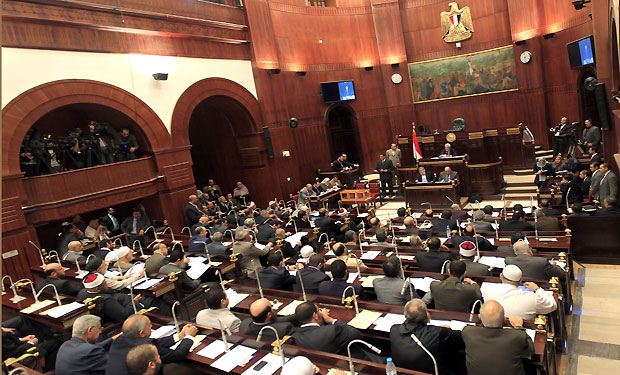
Members of Egypt’s constitution committee meet at the Shura Council for the final vote on a draft Egyptian constitution in Cairo. (Reuters)
Cairo, Asharq Al-Awsat—The 50-member committee drafting Egypt’s constitution has denied that a final draft of the constitution is ready, in addition to rejecting claims that the Salafist Al-Nour Party representatives had walked out of deliberations over Article 2.
A member of the constitutional panel speaking to Asharq Al-Awsat on the condition of anonymity said: “The final version of the constitution will be discussed during public sessions of the 50-member committee starting from Wednesday.” The source added that all constitutional committee members would attend the final vote.
Prominent Egyptian opposition leader Mohamed Abu El-Ghar affirmed that the final vote on the draft constitution will take place later this week, with voting ending before the December 3 deadline.
In exclusive comments to Asharq Al-Awsat, Abu El-Ghar added that he expects the new constitution—when it is finalized—to pass the nationwide referendum with more than 75 percent of the vote, adding that even the majority of Egypt’s Salafists will vote yes on the new constitution.
Mohamed Abu El-Ghar, leader of the Egyptian Social Democratic Party and a member of the 50-member panel tasked with drafting the constitution, confirmed that the majority of constitutional articles have already been finalized and agreed on, with only a few articles left to be considered.
Abu El-Ghar confirmed that the draft constitution will be very different to the 2012 constitution drawn up by a Muslim Brotherhood-dominated panel. He stressed that the new constitution will seek to highlight the position of the civil state, while also preserving Islamic Shari’a law as the basis for laws in the country. He added that the draft constitution will include unprecedented budgetary restrictions.
“For the first time ever, an Egyptian constitution will reserve a certain amount of percentage of national income to be spent on education, healthcare and scientific research. This is something that has never happened before, and will achieve huge changes in Egypt’s future,” Abu El-Ghar said.
Commenting on the possibility of Egypt imposing an electoral quota system, Abu El-Ghar said: “There are consultations currently underway to develop an electoral quota for Copts, women and workers in order to guarantee their participation in parliament, but there has yet to be a final agreement on this.”
“We will base our position according to the shape of this [quota] system,” he added.
A constitutional sub-committee had been formed to discuss the issue of parliamentary quotes before presenting it to the 50-member committee for vote. However the latest to come out of the committee was that the draft article had been abolished, despite some members arguing in favor of a quota. A constitutional article mandating that 50 percent of parliamentarians should be either workers or farmers has been in place since the 1960s, but has become the subject of increasing controversy in recent years. A new or amended article could see Copts, women, and youth included in a quota system.
As for abolishing controversial Article 219 of the 2012 constitution, which is an article that the Salafists, and to a lesser extent Al-Azhar, have committed to, Abu El-Ghar informed Asharq Al-Awsat that this will be replaced by amended language in Egypt’s constitutional preface.
“Instead of this [Article 219], text based on the Supreme Constitutional Court’s interpretation of Islamic Sharia law will be included in the constitution’s preface,” he said.
“This is clear and there is no problem or issue over this,” he added.
Article 219 states: “The principles of Islamic Shari’a include its commonly accepted interpretations, its fundamental and jurisprudential rules, and its widely considered sources, as stated by the schools of Sunna and Gamaa.”’
Commenting on objections regarding a perceived lack of constitutional language explicitly highlighting the “civil” nature of the Egyptian state, Abu El-Ghar said: “The constitution itself is based on the principle of the civil state and so does not need to explicitly reference this.”
As for the issue of civilians being tried in military court, he said that the Egyptian Social Democratic Party completely rejects this, and that he personally voted against this measure but was overruled by a majority vote.
